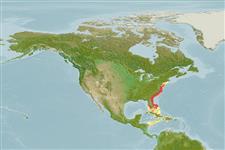>
Eupercaria/misc (Various families in series Eupercaria) >
Sciaenidae (Drums or croakers)
Etymology: Cynoscion: Greek, kyon = dog + Greek, odous = teeth + Greek, skion, skiaina = barbel, red mullet (Ref. 45335).
More on author: Cuvier.
Environment: milieu / climate zone / depth range / distribution range
Sinh thái học
Biển; Thuộc về nước lợ gần đáy; không di cư (Ref. 94474); Mức độ sâu 10 - ? m (Ref. 9988). Subtropical; 42°N - 15°N, 83°W - 70°W (Ref. 94474)
Western Atlantic: New York to southern Florida in USA and the entire Gulf of Mexico. Northeastern Atlantic: recently reported from Guadalquivir River estuary in Spain (Ref. 94474).
Length at first maturity / Bộ gần gũi / Khối lượng (Trọng lượng) / Age
Maturity: Lm 26.8, range 25 - 35 cm
Max length : 100.0 cm TL con đực/không giới tính; (Ref. 40637); common length : 36.0 cm TL con đực/không giới tính; (Ref. 3702); Khối lượng cực đại được công bố: 7.9 kg (Ref. 40637); Tuổi cực đại được báo cáo: 18 các năm (Ref. 12193)
Các tia vây lưng cứng (tổng cộng) : 9 - 11; Các vây lưng mềm (tổng cộng) : 25 - 28; Tia cứng vây hậu môn: 2; Tia mềm vây hậu môn: 10 - 11. Body silvery, dark grey on back with bluish reflections and numerous round black spots irregularly scattered on upper half, extending to dorsal and caudal fin. Spinous dorsal fin dusky, other fins pale to yellowish. Mouth large, oblique lower jaw projecting. Upper jaw with a pair of large canine-like teeth at tip. Lower jaw with an enlarged inner row of teeth, uniform in size and closely set. Chin without barbels or pores. Snout with 2 marginal pores. Gas bladder with a pair of nearly straight horn-like appendages. Soft portion of dorsal fin unscaled (Ref 51721).
Inhabits river estuaries and shallow coastal marine waters over sand bottoms, often associated with seagrass beds. Also occurs in salt marshes and tidal pools of high salinity. Feeds mainly on crustaceans and fishes. An important food and sport fish throughout its range. Utilized fresh for steaming, broiling and baking (Ref. 9988).
Robins, C.R. and G.C. Ray, 1986. A field guide to Atlantic coast fishes of North America. Houghton Mifflin Company, Boston, U.S.A. 354 p. (Ref. 7251)
IUCN Red List Status (Ref. 130435)
Threat to humans
Harmless
Human uses
Các nghề cá: Tính thương mại; cá để chơi: đúng
Các công cụ
Special reports
Download XML
Các nguồn internet
Estimates based on models
Preferred temperature (Ref.
123201): 12 - 26.7, mean 24.3 °C (based on 88 cells).
Phylogenetic diversity index (Ref.
82804): PD
50 = 0.5000 [Uniqueness, from 0.5 = low to 2.0 = high].
Bayesian length-weight: a=0.00813 (0.00502 - 0.01317), b=3.05 (2.92 - 3.18), in cm total length, based on LWR estimates for this species & Genus-body shape (Ref.
93245).
Mức dinh dưỡng (Ref.
69278): 4.0 ±0.66 se; based on food items.
Generation time: 5.8 (4.0 - 6.7) years. Estimated as median ln(3)/K based on 13
growth studies.
Thích nghi nhanh (Ref.
120179): Trung bình, thời gian nhân đôi của chủng quần tối thiểu là 1.4 - 4.4 năm (K=0.2-0.3; tmax=18; tm=1; Fec=1 million).
Prior r = 0.69, 95% CL = 0.46 - 1.04, Based on 1 data-limited stock assessment.
Fishing Vulnerability (Ref.
59153): High vulnerability (58 of 100).
Climate Vulnerability (Ref.
125649): High vulnerability (60 of 100).
Nutrients (Ref.
124155): Calcium = 43.1 [25.3, 82.0] mg/100g; Iron = 0.771 [0.408, 1.320] mg/100g; Protein = 19.1 [17.7, 20.8] %; Omega3 = 0.33 [0.20, 0.51] g/100g; Selenium = 30.9 [16.5, 56.8] μg/100g; VitaminA = 9.52 [3.34, 29.64] μg/100g; Zinc = 0.667 [0.495, 0.966] mg/100g (wet weight);
